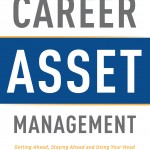For anyone under the age of 60, the focus of financial planning shouldn’t be on financial assets (i.e. investments) but rather their career asset. The reason is that the majority of a person’s financial assets come from their career asset (perhaps with the exception of lottery winners or an inheritance). Focusing on only financial assets ignores this relationship. What do I mean by career asset?
It’s simply the present value of future wages & other earned income streams. For many people (even those in their 50’s), the income they will earn in the next decade or more exceeds what they have in retirement accounts. So what are some of the implications of focusing on this important asset we call our careers?
There are five areas that directly relate to personal finance based on your career. Due to space limitations, I’ll outline each area in this col umn and expand further next month. When it comes to your career asset, you can:
umn and expand further next month. When it comes to your career asset, you can:
- Convert it (by consistently setting aside a small portion to make work optional in the future by accumulating financial assets)
- Protect it (with adequate cash reserves, disability and life insurance in case the ability to work is compromised prematurely)
- Borrow on it (the concept of borrowing to buy a car or a house is predicated on the ability to repay the loan which often requires a steady stream of future income—the more income, the more you can borrow)
- Grow it (networking, benchmarking compensation, & professional development are crucial tactics for increasing your career asset)
- Enjoy it (if you’re going to spend decades doing something, it’s in your own interest to make sure it’s something you find meaning & fulfillment doing)
While some of these areas relate to traditional financial planning topics such as insurance and investments, it’s unusual to see how all the pieces are interconnected. For example, owning life insurance is not meant to stave off death (which is unavoidable) but rather to replace income in the case of an untimely death. Most people would like to eventually stop working which is tied to their ability to convert their wages to savings by setting aside a portion on a consistent basis.
Conveniently, my business partner Mike Haubrich literally wrote the book on managing your career like you would other financial assets. The book “Career Asset Management” is helpful in developing the right mindset around the opportunity and responsibility each of us have to optimizing our careers based on our life goals.




